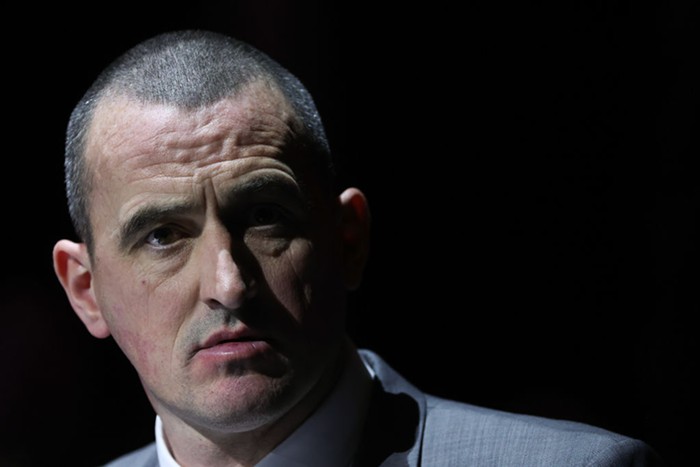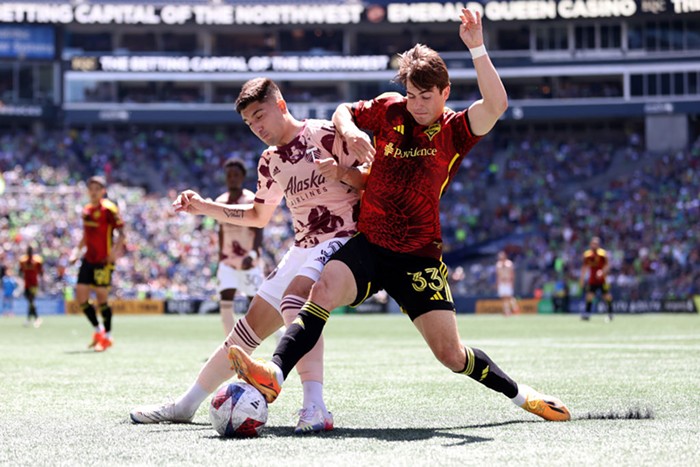
The Whitecaps, the Western Conference's worst team, walked out onto the field, dropped ten players behind the ball, ceded possession, attempted make life as difficult as possible for the Timbers' potent attack, and hang on for a draw.
After 45 minutes played in a steady rain, they were in business. But a rocket of a goal from young Costa Rican winger Marvin Loría, making just his fourth start of the season in place of an injured Brian Fernandez, swung the evening the Timbers' way.
They'd go on to win 3-1, matching the positive results of playoff rivals Dallas and Real Salt Lake and boosting themselves into pole position to retake the Cascadia Cup when the Seattle Sounders come calling in less than two weeks.
It wasn't the prettiest game the Timbers have played this year. But it featured plenty of pretty goals, and was most certainly, following a pair of excruciatingly narrow defeats in Minnesota, a much-needed happy ending to a difficult week.
In addition to Fernandez, held out for precautionary reasons, the Timbers were without several other key starters: Larrys Mabiala, Jorge Moreira, and Cristhian Paredes all settling for places on the bench after starting both matches against the Loons.
Vancouver, enduring their worst season since they joined MLS alongside Portland eight years ago, made the trip south with little to play for. But they were well-rested, and coming off of a rare win — secured in the same, relatively rare 4-3-2-1 Christmas Tree formation that Giovani Savarese used to great effect last spring.
The Timbers are, without question, leagues better this Whitecaps team. But the way the game set up suggested that it might not be a walkover.
Sure enough, in the opening minutes, Portland struggled to make significant inroads. Vancouver's imbalanced formation successfully clogged the middle of the field, forcing the Timbers wide, especially to the right, where they badly missed Moreira's pace and directness.
Then, in minute 20, they'd come close to breaking through. Sebastian Blanco fired a shot from the left side fo the box that Whitecaps goalkeeper Maxime Crepeau palmed away in the other direction — into the path of Diego Valeri, who rifled the ball back towards goal only to see it headed away by Ali Adnan.
Adnan would exit the game moments later with a non-contact adductor injury, and minutes after that, Blanco picked up a pass from Valeri, stepped inside, and cracked a shot through the rain that swerved in front of Crepeau, and flew off his hands into the side netting.
It was the break the Timbers needed — a moment of individual inspiration from one of their immensely talented attackers — and one of the last ways the Whitecaps wanted to concede.
In fact, the way Vancouver was attacking, it might well have decided the game. Their only forward outlet was Yordy Renya, a winger lined up at striker, who time and again attempted to latch onto long balls in behind the Timbers' central defense, but was left with no support if and when he did.
The Timbers' center backs largely dealt with the Peruvian's threat well enough, but but a misplay by Julio Cascante late in the half, allowing Reyna to retain possession, would prove costly when the Whitecaps went on to win a corner and make Portland pay.

It was the very first goal of the 18-year-old's professional career, and he celebrated it by racing towards the Whitecaps bench and traveling support at the opposite end of the stadium. Afterwards, he'd call it "the most unbelievable moment of my life." As excellent as Blanco's goal had been, this strike was even better — and more sudden.
Bair nearly gave it right back in first half stoppage time when he headed a ball off his arm as he tried to make a clearance in the Vancouver penalty area, but referee Ted Unkel waved away the Timbers' vociferous protests.
Savarese and a number of players continued to hound Unkel after he blew the whistle for halftime, no doubt recalling the penalty decisions that cost them their last two games, but no relief was forthcoming. They were going to have to dig a result out on their own.
The soccer the Timbers played starting immediately after the restart was more inventive and encouraging, but it was another moment of individual brilliance, this time from Loría, that would make a world of difference.
Ten minutes into the half, the Costa Rican drifted wide left to receive a cross-field switch from Blanco, took it down, cut inside, and then, from 25 yards, whipped a low, bending shot into the far corner. This time, Crepeau didn't touch it. He didn't have a chance.
It was a statement of goal. Loría is in this team and this league to stay, to the point where he's done here in a few short months more than Andy Polo, a full national teamer with Peru, has done in a year-and-a-half.
That, again, seemed like it might put the Timbers in the clear. But Reyna had the ball in the net just a minute later for Vancouver, played through by Montero after the former Sounder intercepted an outlet from Bill Tuiloma, only for a late offside flag to rule out what seemed a shocking second equalizer.
It was a fractional decision, and it as close as Vancouver would get to drawing back level. They had neither the talent nor the attacking commitment necessary to put the Timbers under a substantial amount of pressure.
The final goal of the game was of the familiar sort: a lightning-quick, perfectly-executed Timbers counter.
In the final minute of normal time, Valeri received a pass in a pocket of space in the center circle, turned, and slid a ball through for substitute Tomas Conechny. Jeremy Ebobisse made a hard run on the weakside, the substitute found him with a centering pass, and, seconds later, it was 3-1.
With that, the Timbers crossed the finish line in style. 2-1 would have been just as good, but to see Conechny and Ebobisse combining so expertly, after Loría's standout contribution earlier, on top of Renzo Zambrano's steady performance, must have made Savarese's heart sing.
Youth development is one of the several areas in which Savarese and his staff have departed markedly from the Caleb Porter era, and the payoff this season has already been immense. The Timbers are going to need big games from most everyone they have during the next few months, and this was a terrific start.
There's nine games to go on this marathon homestand. The Timbers should be plenty confident about which way it's heading.

















